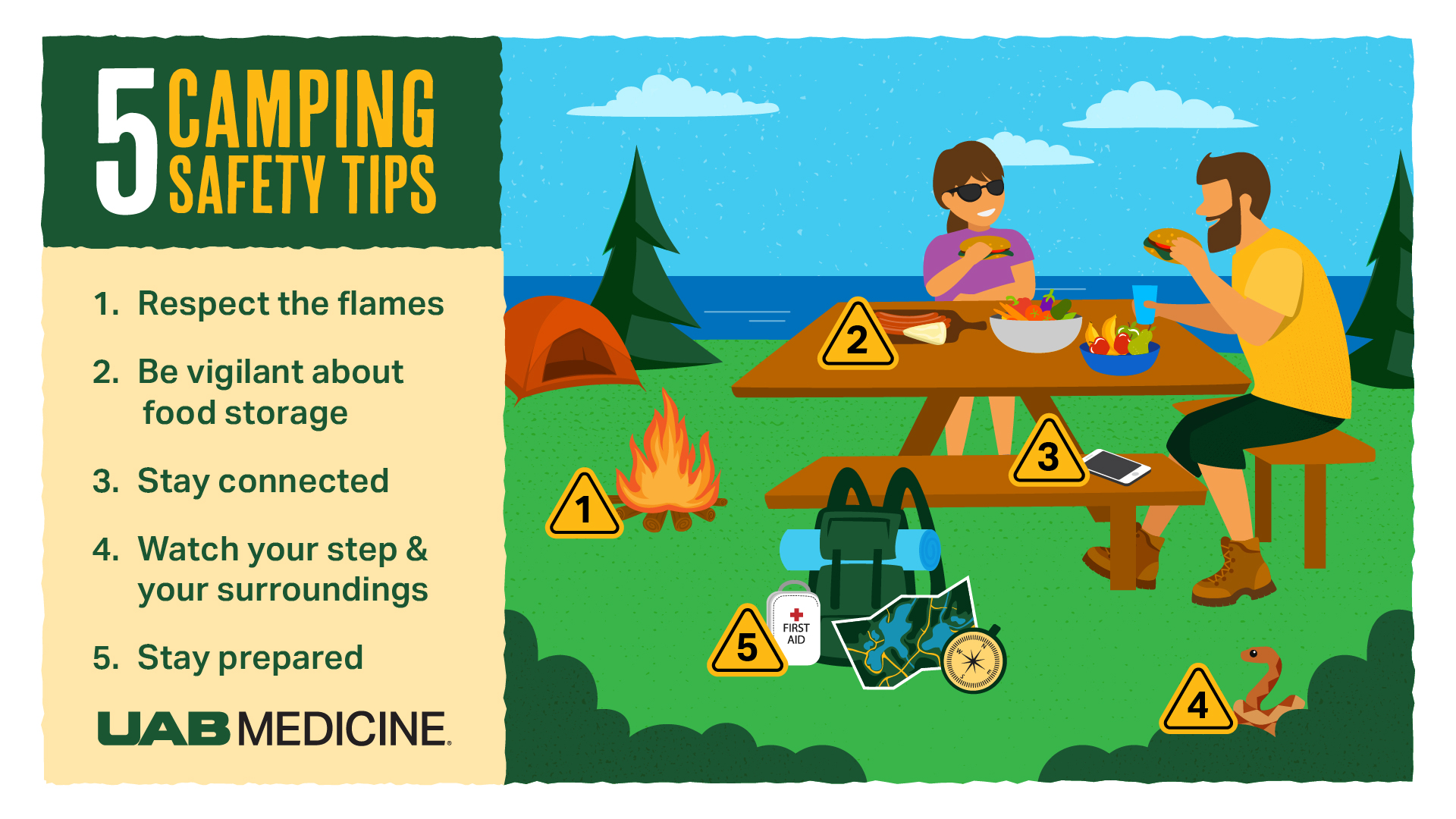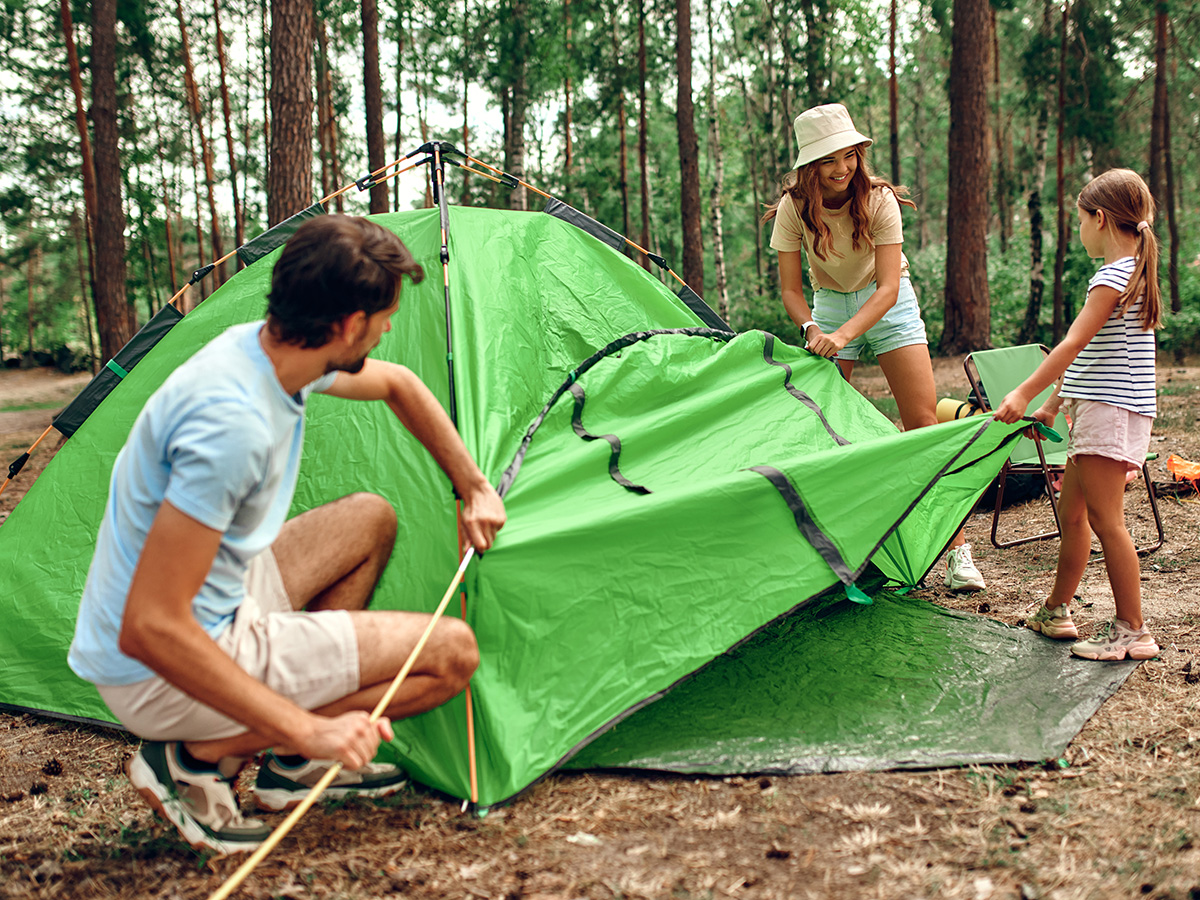
As summer approaches, more families are dusting off their tents and heading into the great outdoors. While camping offers a chance to unplug and enjoy nature, it also comes with serious risks. Brandon Buchel, M.D., an emergency room physician at UAB St. Vincent’s, sees firsthand what can go wrong — and has advice on how to make sure camping trips do not end in a visit to the ER.
Fire safety: Respect the flames
Campfires are a camping tradition, but they are also one of the most common sources of injury in the wilderness.
 Summertime lends itself to the joys of outdoor activities, like camping. With a little preparation and a lot of respect for the outdoors, campers can have a safe and unforgettable experience.“Burns are a huge issue every camping season,” Buchel said. “People often underestimate how quickly a fire can get out of control or how hot embers can stay long after the flames have died down.”
Summertime lends itself to the joys of outdoor activities, like camping. With a little preparation and a lot of respect for the outdoors, campers can have a safe and unforgettable experience.“Burns are a huge issue every camping season,” Buchel said. “People often underestimate how quickly a fire can get out of control or how hot embers can stay long after the flames have died down.”
“If you do suffer a burn, the first step is to immediately cool the burn by running it under lukewarm (not cold) water,” Buchel said. “This can help reduce pain and limit skin damage. After cooling, gently clean the area with mild soap and water. Cover the burn with a sterile, non-stick bandage to protect it from infection. If your burn is severe, blistering or covering a large area, please seek emergency medical attention immediately.”
While it might be tempting to use common household items to treat burns, many do more harm than good. Here are some home remedies that should be avoided:
- Ice or ice water: Applying ice can constrict blood vessels and worsen tissue damage. Always use lukewarm water for cooling.
- Butter or oil: These can trap heat in the skin and lead to infection. They do provide the cooling effect needed for a burn.
- Vinegar, mustard or rubbing alcohol: These substances can irritate the skin and cause further damage or pain.
- Toothpaste: Although some may suggest it for its cooling effect, toothpaste can irritate the burn and introduce bacteria.
- Honey: While honey has antibacterial properties, it can also trap heat and is not an appropriate first treatment for burns.
Prompt and proper care can significantly impact healing and minimize complications. Avoiding common home remedies that can worsen the situation is crucial. Always consult a health care professional if you are unsure about the severity of a burn or how to treat it properly.
Buchel emphasizes keeping the fire small and contained, and never leaving it unattended. Always have a bucket of water or dirt nearby to extinguish the fire quickly if needed, he says. Buchel also reminds campers to keep the area around a fit pit clear of tools and other items to avoid tripping and falling near the flames.
“Clear a 10-foot area around the fire pit of any dry leaves or flammable materials, and teach children to keep a safe distance at all times,” Buchel said.
Food safety: Protecting yourself and the wildlife
Campers must be vigilant about food storage to prevent attracting dangerous animals — and about food preparation to avoid getting sick.
“Improper food handling can easily ruin a trip and land you in the hospital,” Buchel said. “We see a lot of food-borne illnesses from undercooked meats or spoiled dairy products.”
Buchel advises keeping raw and cooked foods separate, using a thermometer to make sure meats reach safe internal temperatures, and keeping perishable foods in a cooler packed with ice.
“If the food gets above 40°F for more than two hours, you should throw it away — it’s not worth the risk,” Buchel said.
As for keeping animals away, Buchel stresses secure storage. “Use bear-proof containers if you’re in bear country, and never keep food in your tent,” Buchel said. “Even a seemingly harmless raccoon can carry diseases and create a dangerous situation.”
Hiking safety: Watch your step and your surroundings
Proper hiking attire and awareness of the environment can prevent a host of injuries and emergencies.
“Every year, we see sprains, broken bones and snakebites because people weren’t prepared,” Buchel said. “Good boots with ankle support are essential, and wearing long pants can help protect against things like poison ivy and ticks.”
He also highlights the importance of trail safety. “Stay on marked trails,” Buchel said. “Going off-trail increases your risk of encountering snakes, stepping into a hornet’s nest or getting lost.”
If wildlife is encountered, Buchel recommends keeping a safe distance and avoiding sudden movements.
UAB Comprehensive Snakebite Program is the only program in the state to offer snakebite care in an outpatient setting. Learn more here.
“Snakes generally don’t want to interact with you,” Buchel said. “Most bites happen when someone accidentally steps on one or tries to handle it.”
General safety: Stay prepared, stay connected
In any camping scenario, preparation can be the difference between an inconvenience and a life-threatening situation.
“Always have a method of communication, like a charged cellphone or a satellite device, if you’re going off-grid,” Buchel said. “And let someone know your itinerary before you leave.”
A well-stocked first aid kit is a must. Buchel recommends it includes:
- Adhesive bandages in various sizes
- Sterile gauze and adhesive tape
- Antiseptic wipes and antibiotic ointment
- Tweezers (for ticks or splinters)
- Hydrocortisone cream (for insect bites or poison ivy)
- Pain relievers like ibuprofen
- Antihistamines for allergic reactions
- A digital thermometer
- A space blanket
- Scissors
“Having these basics can stabilize minor injuries until you can get professional care,” Buchel said.
Finally, Buchel underscores the importance of knowing where you are at all times and sticking with your group. “In emergencies, time is always critical,” Buchel said. “Stay together, stay alert, and trust your instincts. If something feels unsafe, it probably is.”
With a little preparation and a lot of respect for the outdoors, Buchel believes campers can have a safe and unforgettable experience. “Nature is beautiful but also unpredictable,” Buchel said. “A little caution goes a long way toward making sure you bring home only good memories.”